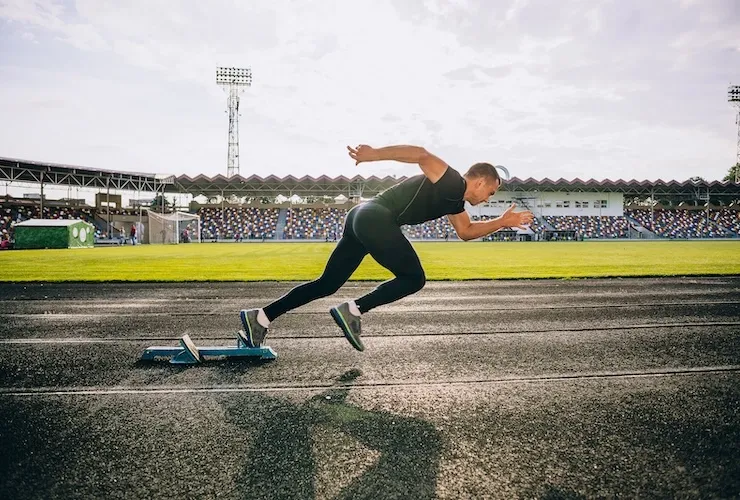If you've ever wondered how long it takes to run 1.5 miles, you're not alone. Whether you're a seasoned runner looking to improve your speed or a beginner aiming to set a baseline, understanding the factors influencing this timeframe is crucial.
In this article, we'll delve into the average time to run 1.5 miles and explore the various elements that can affect your performance, including age, fitness level, terrain, and weather conditions.
We'll provide practical tips on enhancing your running time through training plans, speed workouts, muscle strengthening, and proper hydration and nutrition.
We'll uncover the multiple benefits of running 1.5 miles, from enhancing cardiovascular health and aiding in weight loss to boosting mood and fortifying muscles and bones.
So, if you're ready to optimize your running performance and reap the rewards, read on to discover all you need to know about running 1.5 miles.
Key Takeaways:
- On average, it takes about 12-15 minutes to run 1.5 miles, depending on age, fitness level, terrain, and weather conditions.
- Incorporating speed workouts and following a training plan can help improve your time to run 1.5 miles.
- Running 1.5 miles has numerous benefits, including improving cardiovascular health, aiding in weight loss, boosting mood, and strengthening muscles and bones.
How Long Does It Take To Run 1.5 Miles?
The time it takes to run 1.5 miles varies depending on individual fitness levels, training frequency, and running pace.
For novice runners, completing a 1.5-mile run can take around 15-20 minutes, while experienced runners can achieve this distance in 10-12 minutes. The running pace is a significant factor, as those maintaining a pace of 8-10 minutes per mile will complete the run faster than those with a pace of 12-15 minutes per mile. Training frequency and fitness level also play crucial roles in reducing the time required to finish the run, with regular training and higher fitness levels leading to improved run times.
What Is The Average Time To Run 1.5 Miles?
The average time to run 1.5 miles can vary widely, with some achieving faster times while others may fall within the average mile time range.
The average mile time for men can range from 5:00 to 8:00 minutes, while for women, it typically falls between 6:00 to 10:00 minutes. With consistent training and dedication, individuals can improve their mile time and complete 1.5 miles in under 12 minutes. Factors such as endurance, speed, and overall fitness level are crucial in achieving faster times. Setting incremental goals and following a well-structured training plan can contribute to shaving off precious seconds from each mile, leading to remarkable improvements in overall performance.
What Are The Factors That Affect The Time To Run 1.5 Miles?
Several factors influence the time required to run 1.5 miles, including fitness level, aerobic capacity, and the pace per mile that an individual can sustain.
While a higher fitness level generally leads to a faster 1.5-mile run time, aerobic capacity also plays a crucial role. Individuals with a well-developed aerobic system tend to maintain a more efficient pace over the entire distance, resulting in a quicker overall time. The relationship between pace per mile and overall performance is vital. A consistent and manageable pace contributes to better endurance and a faster finish. It's fascinating how these elements interplay and contribute to an individual's performance in a short-distance run.
#1 Age
Age can significantly impact the time it takes to complete a 1.5-mile run, as connective tissues and overall endurance may vary with age.
Research has shown that as individuals age, the elasticity and strength of connective tissues may decrease, leading to longer recovery times and reduced performance in endurance activities like running. As a result, the average 1.5-mile run times tend to increase with age. For example, a study examining the average run times across different age groups found that while individuals in their 20s may complete the run in about 10 minutes, those in their 50s may take closer to 15 minutes. This demonstrates the pronounced influence of age on running performance.
#2 Fitness Level
The current fitness level plays a crucial role in determining the time it takes to run 1.5 miles, with elite runners achieving faster times than those at an average or novice running level.
Elite runners often exhibit exceptional endurance, strength, and cardiovascular capacity that contribute to their ability to cover 1.5 miles in rapid times. Their extensive training regimens and focus on speed and agility enable them to consistently improve their running pace, setting them apart from average and novice runners.
On the other hand, regular exercise and personalized training programs can significantly enhance the performance of average and novice runners, gradually bridging the gap in their running times compared to elite runners.
#3 Terrain
The terrain on which the 1.5-mile run is performed can affect the overall pace, with ideal and steady pace requirements varying based on different terrains.
For instance, running on hilly terrain demands extra exertion and a more conservative pace on uphill climbs to conserve energy, while downhill stretches allow for faster speeds. On the other hand, running on flat terrain enables a more consistent pace but may require increased mental stamina. Running on uneven or unpaved surfaces, such as trails or grass, often results in slower times due to the need for cautious maneuvering and its impact on the body.
#4 Weather Conditions
Weather conditions such as temperature and humidity can affect the distance-pace time relationship, potentially influencing the time it takes to complete the 1.5-mile run.
When the temperature rises, the body works harder to cool itself through perspiration, potentially leading to an increased heart rate and faster fatigue. On the other hand, colder temperatures can constrict blood vessels, affecting oxygen delivery to muscles and altering running efficiency.
Humidity also plays a significant role, as high humidity levels can hinder sweat evaporation, making it more challenging for the body to regulate its temperature efficiently. This can negatively impact an individual's ability to maintain a consistent pace and may result in a slower overall finishing time for the 1.5-mile run.
How do you improve your time to run 1.5 miles?
Improving the time to run 1.5 miles involves incorporating interval training, strengthening muscles, and ensuring adequate recovery for enhanced aerobic capacity and overall performance.
Interval training is a highly effective strategy to improve running performance. By alternating between periods of high-intensity running and active recovery, it enhances cardiovascular endurance and builds speed and stamina.
Additionally, muscle-strengthening exercises such as squats, lunges, and calf raises are vital in improving running efficiency, reducing the risk of injuries, and enhancing overall power and endurance.
Furthermore, active recovery involving light exercises, stretching, and adequate rest is crucial for allowing the body to adapt and strengthen, thereby reducing the risk of overtraining and promoting optimal performance during subsequent runs.
1. Follow A Training Plan
Adhering to a structured training plan is essential to improve the time it takes to run 1.5 miles, involving a systematic approach to training sessions and a week-by-week progression.
An effective training plan for enhancing 1.5-mile run times should incorporate a variety of training methods, including:
- interval training,
- long runs,
- speed work, and
- resistance training.
It's important to gradually increase the intensity and duration of these sessions to build endurance and speed. The plan should include adequate rest days for recovery and prevent overtraining. Monitoring progress through regular fitness assessments and adjusting the plan is also crucial for continual improvement.
2. Incorporate Speed Workouts
Integrating speed workouts into the training regimen can significantly improve the time to run 1.5 miles, involving controlled speed exercises, basic speed drills, and compound exercises such as 2 X 400-meter sprints.
These various speed workouts are essential for enhancing both speed and endurance, crucial for excelling in mid-distance races like the 1.5-mile run. While the controlled speed exercises, like tempo runs, help maintain a solid and steady pace, the basic speed drills focus on improving acceleration and overall running technique.
Specific compound exercises, such as hill sprints and interval training, are instrumental in conditioning the muscles to handle the demands of sustained speed. Speed workouts are crucial in achieving peak performance for the 1.5-mile run by training the body to efficiently manage energy utilization and build strength.
3. Strengthen Your Muscles
Enhancing muscle strength through core exercises and total-body strength training can significantly improve 1.5-mile run times, emphasizing the role of specific compound exercises.
Stronger muscles provide better support and stability for the body, leading to improved running efficiency and reduced risk of injuries. Core exercises, such as planks and Russian twists, target the abdominal, oblique, and lower back muscles, enhancing overall stability and posture during running. Total-body strength training, including squats, deadlifts, and lunges, contributes to balanced muscle development, facilitating power generation and endurance during the run.
The impact of specific compound exercises like bench presses, pull-ups, and push-ups on muscle development cannot be overlooked. These exercises engage multiple muscle groups simultaneously, promoting a more comprehensive strength enhancement that directly translates to better 1.5-mile run performance. By focusing on compound movements, individuals can efficiently build strength in key muscle groups, such as the chest, back, shoulders, and arms, which are crucial for sustaining an optimal running posture and propelling the body forward.
4. Stay Hydrated And Fuel Your Body Properly
Optimal hydration and proper nutrition are essential for sustaining aerobic capacity and supporting improved 1.5-mile run times, complemented by incorporating deep breathing and cardiovascular exercises.
Hydration is crucial in maintaining blood volume and body temperature regulation, facilitating efficient oxygen transport to working muscles during the run. Consuming adequate water before, during, and after the workout is vital to prevent dehydration and its detrimental effects on performance. Pairing this with a well-balanced diet rich in nutrients like lean proteins, complex carbohydrates, and healthy fats is equally important, providing the energy and nutrients needed for sustained endurance.
Deep breathing exercises and cardiovascular activities can train the body to utilize oxygen more effectively, improving overall cardiorespiratory fitness and enhancing endurance for the 1.5-mile run.
What Are The Benefits Of Running 1.5 Miles?
Running 1.5 miles offers a range of benefits, including improvements in cardiovascular health, weight loss, the release of endorphins, and the development of stronger muscles.
Regular 1.5-mile runs can significantly improve the efficiency of the heart and circulatory system, reducing the risk of developing cardiovascular diseases such as heart attack, stroke, and high blood pressure. It aids in maintaining a healthy weight by burning calories and boosting metabolism, contributing to weight loss and toning of the body. The release of endorphins during these runs has been linked to a surge in positive moods and reduced feelings of stress and anxiety. The musculoskeletal system reaps benefits from this targeted distance, as it helps strengthen and tone the leg muscles, enhancing overall physical fitness.
#1 Improves Cardiovascular Health
Running 1.5 miles improves cardiovascular health by enhancing aerobic capacity through regular exercise, potentially reducing stress levels and promoting overall well-being.
Aerobic capacity, which refers to the body's ability to deliver and utilize oxygen during exercise, is a critical component of cardiovascular fitness. By engaging in a consistent running routine, individuals can strengthen their heart and lungs, leading to improved circulation, lower blood pressure, and a reduced risk of heart disease. The release of endorphins during running can reduce stress, contributing to a sense of mental well-being and overall quality of life. This holistic approach to health highlights the significant impact that regular running can have on physical and mental well-being.
#2 Aids In Weight Loss
Running 1.5 miles aids in weight loss by promoting regular exercise, incorporating brisk walking and compound exercises to support effective weight management and stress reduction.
Regular exercise, such as running 1.5 miles, is crucial to weight loss by increasing metabolism and burning calories. It strengthens the cardiovascular system, improves endurance, and helps tone muscles. Incorporating brisk walking and compound exercises into the routine enhances overall fitness and encourages fat loss. These activities not only aid in shedding unwanted pounds but also reduce stress and improve mental well-being. By integrating these into your daily routine, you can achieve sustainable and healthy weight management.
#3 Releases Endorphins And Boosts Mood
Running 1.5 miles can release endorphins, effectively boosting mood and mental well-being, complemented by deep breathing exercises and active recovery techniques.
This natural process occurs due to the body's response to moderate aerobic exercise, which also triggers endorphin release, resulting in euphoria and reduced pain perception. Deep breathing exercises during running enhance the oxygen flow to the brain, further contributing to the release of endorphins and promoting mental clarity.
Engaging in active recovery techniques post-run, such as gentle stretching or yoga, fosters relaxation and reduces stress. Over time, the consistent release of endorphins through regular running and complementary activities could improve mental well-being, emphasizing the interconnectedness between physical activity and mental health.
#4 Builds Stronger Muscles And Bones
Running 1.5 miles contributes to developing stronger muscles and bones through the engagement of core exercises, potentially reducing stress levels and promoting effective recovery.
Running, particularly over a 1.5-mile distance, engages various muscle groups, such as the quads, hamstrings, and calf muscles, improving muscular strength and endurance. The impact and weight-bearing nature of running positively stimulate bone density, enhancing skeletal strength and reducing the risk of osteoporosis. Engaging in this form of cardio exercise releases endorphins, which help manage stress levels and promote an effective recovery process.



